The views expressed in our content reflect individual perspectives and do not represent the authoritative views of the Baha'i Faith.
According to the New Testament (Acts 11:19, 21, 24), some disciples of Jesus went to Antioch to teach the Gospel. By doing so, they created thus the first Christian urban community outside Jerusalem. That’s why Antioch has often been called “the cradle of Christianity.”
In Muslim traditions, those early Christians are depicted as “Muslims,” who convert the king and the inhabitants into Muslims, by working miracles just like Jesus.
Why are the Christians described as “Muslims,” you may ask? Here’s why:
The Qur’an emphasizes that the prophets of the Abrahamic tradition before Muhammad and their followers are each called “muslim,” i.e. a “true believer” or “he/she who submits to God.” So the Islamic story of Peter in Antioch serves as evidence for the superiority of “Islam” (in its historical expression as Christianity) or the true religion of God, over polytheistic beliefs. In some Muslim versions, Paul and John are sent to Antioch. Then Peter joins them later on, in order to release them from imprisonment and fulfill their mission. In other accounts, it is Paul who comes last to Antioch in order to help Peter and John.
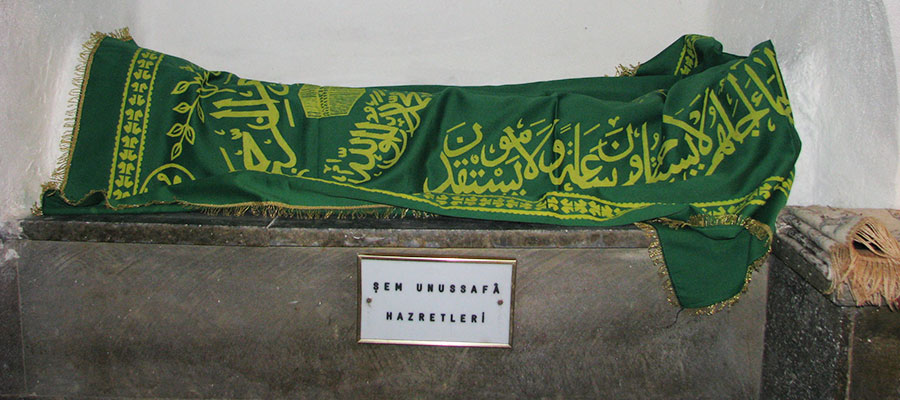
A coffin in the Habib Neccar/Najjar Mosque in Anktakya supposedly containing Peter (Sham’un as-Safa).
According to one Muslim account, Jesus sent “envoys and disciples” to Antioch. Among these Christian teachers was Simon the Rock, i.e. Peter, and John, who first arrive in Antioch.
There, Peter and John meet a man from Antioch. But the natives are not welcoming—quite the opposite, in fact. They beat the disciples, and then incarcerate them in a dungeon. Commanded by the king, they slay the man the disciples met, and while his head falls to the ground, he exclaims: “O people, follow the Envoys!” – Qur’an 36:19.
Meanwhile, according to this account, Paul receives a “revelation” from God in Damascus, telling him to proceed to Antioch to help the disciples. In a clever ploy, Paul enters Antioch as a priest of the idol-worshippers. After a while, Paul becomes the king’s companion, miraculously conversing in the king’s native language.
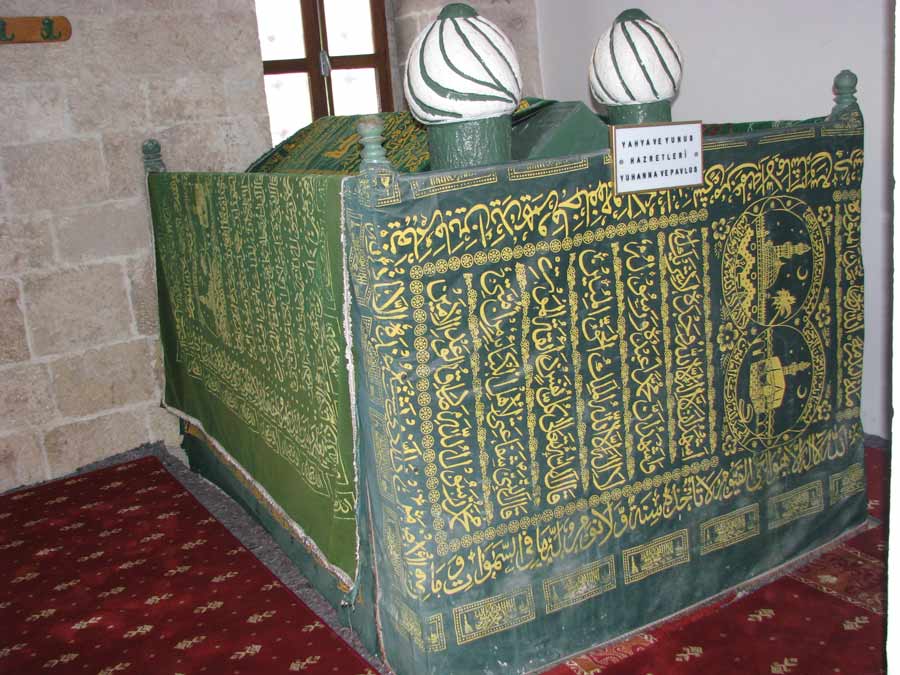
A coffin supposedly containing Paul in the Habib Neccar/Najjar Mosque in Anktakya.
One day, Paul asks the king about the imprisoned men. Paul convinces the king to investigate their new religion—Islam, i.e. Christianity—which claims to give them the power to heal the sick and revive the dead.
So the two Christian prisoners are brought before the king. There, in the royal court, Paul challenges Peter and John: “Produce your proof, if you speak truly.” – Qur’an 2:111; 27:64. Peter and John prove it by restoring sight to a blind man. Then they heal a cripple.
Paul then persuades the king that he himself has the same powers and proves this to be true. Finally, Paul asks Peter and John whether they have more proofs. They reply: “We bring the dead to life.” – Qur’an 36:11. This time, Paul admits that he is incapable of resuscitating the dead. But Paul vows that, if the disciples revive the king’s dead son, then Paul shall confess his faith in Jesus. The king, too, promises this.
So Peter and John raise the king’s son from the dead. Consequently Paul, the king and his family all convert to Christianity. The son says that this was done so that they become “true Muslims” (Christians), and then dies again.
At last, Paul, Peter and John admit to the king that they were indeed disciples of Jesus all along, and that they had tricked the king in order to make him a believer in Jesus. Surprisingly, the king did not object to this confession. Instead, the king rejoiced, and banned polytheism from Antioch by destroying the idols and temples, since they contradicted Christianity.
Evidently, this tradition (or a similar version) was used as a kind of parable in the Qur’an, the holy book of Islam. Perhaps the best example is that of the “unbelieving town,” as told in Sūra of Yā Sīn. (See Qur’an 36:13–29.) This qur’anic chapter, Sūra 36, begins with God’s words assuring the prophet Muhammad that he is one of the “Envoys,” sent as a warner to a heedless people (the Meccans in Arabia) who do not believe.
“Strike for them a similitude!” God tells Muhammad, by recounting the story of the “inhabitants of the city, when the Envoys came to it” (Q. 36:13). In classical Islam, the majority of the Qur’an commentators on this passage agree that the “city” is Antakya (the present-day name for Antioch in Turkey).
The names of the “Envoys” – “We sent unto them two” (Q. 36:14) – are not given in the Qur’an itself. But the Qur’an does say that the people of the city branded the first two (Christian) “Envoys” as liars.
Whereupon, according to the Qur’an: “We [God] strengthened with a third.” (See Qur’an 36:14.) But when the people still refused to heed the message of the third teacher, the Qur’an then says that a man came “from the furthest part of the city, running” (Qur’an 36:19–20), and proclaimed: “O people, follow the Envoys!”
This man is identified in various commentaries on the Qur’an as Ḥabīb an-Najjār, who the people in Antakya today think was a Christian martyr. Christian tradition identifies him as Agabos, who was one of the seventy-two disciples (Luke 10:1) and a martyr. In Acts, 11:27–28, he is one of the “prophets [who came] from Jerusalem to Antioch.” (See also Acts 21:10.)
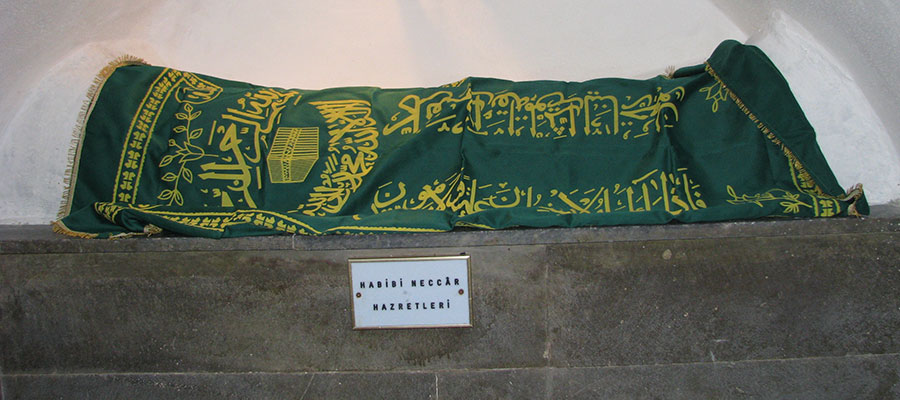
A coffin supposedly containing Ḥabīb an-Najjār in the Habib Neccar/Najjar Mosque in Anktakya.
Although none of most prominent collections of Islamic traditions (known as “Hadith”) mention Antioch, legendary Muslim accounts do—so much so that these Antioch stories came to be regarded as “an integral part of South Arabian tradition.”
Baha’u’llah, the prophet and founder of the Baha’i Faith, interpreted Qur’an 36:14, which states: “When We sent unto them two men, but they cried them lies, so We sent a third as reinforcement. They said, ‘We are assuredly Envoys unto you’.” Here’s what Baha’u’llah says:
And now, concerning thy question regarding what God, thy Lord, hath revealed aforetime to Muhammad in Arabic.
Know thou that the first We have sent in truth was Ali [the Bab]. We made Him dawn at the horizon of Fars [Shiraz] and sent Him down on the shadow of the spirit from the Heaven of God’s transcendent glory.
The other who We have sent was also Ali and We named him in the Concourse on high with Our Name “Quddus.” Thou art verily aware of this.
And we exalted them both with this Beauty [Baha’u’llah] Who in truth hath been manifested and hath risen above the horizon of Revelation with clear authority.
Should We wish to interpret this verse, all the ink and all pens would not suffice. We have however, for the sake of brevity, provided what We have interpreted for thee. – Provisional translation by Necati Alkan.
What happens here is quite remarkable: The story narrated by the Qur’an, which was widely understood to refer to Christians in Antioch, now becomes a prophecy of the future advent of the Bab (accompanied by his foremost disciple, Quddus), and Baha’u’llah, sent as messengers of God to the cosmopolis of global civilization, where the drama of Antioch is reenacted under new circumstances.
You May Also Like
Comments



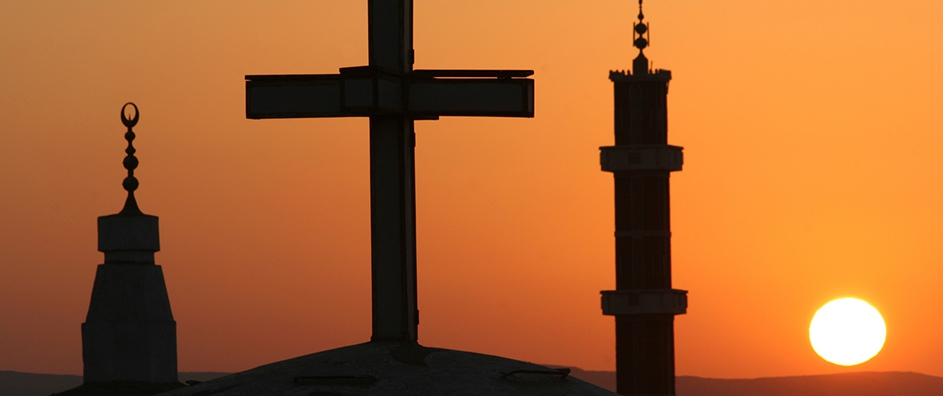
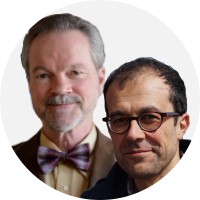
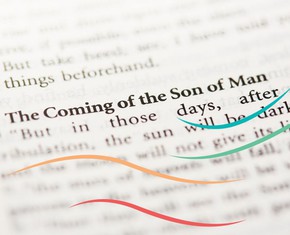











İ found this article interesting about the history of Antioch and the early Christian teaching efforts. Also how the sura Ya Sin and others in the Quran tie into Baha’u’llah’s revelation.